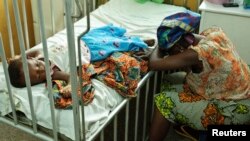YAOUNDE —
In the past 12 months, thousands of children in Cameroon have died of severe diarrhea caused by rotavirus, with thousands more said to be hospitalized.
Although the United Nations has come in to help with a vaccine, local medics say the situation is difficult, given an acute shortage of potable water in major towns.
For many young patients, even RotaTeq, a vaccine designed protects babies against common types of rotaviruses, is not a guarantee against infection.
The United Nations says children vaccinated against rotavirus are 70 percent less likely to be hospitalized for diarrhea compared to unvaccinated children.
According to Dr. Noulna, rotavirus causes diarrhea among children under 5 and is especially dangerous for kids between 12 and 24 months.
"The virus can lead to severe dehydration and, if nothing is done, the child dies," says Desire, adding that vaccines alone will not solve the problem in Cameroon.
"It must be made clear that the sickness is due to poor hygiene and sanitation," he says, adding that people must have access to good quality water and deep latrines. "The vaccine, without sanitation, will be ineffective and the disease will continue to spread."
While many towns in Cameroon are suffering from an acute shortage of drinkable water, the capital, Yaounde, has gone without sufficient potable water for three months. Meanwhile, 70 percent of people in rural areas do not use latrines and prefer to defecate in bushes.
According to Dr. Marie Kobela of Cameroon's national vaccination program, while the country's basic hygiene needs improvement, simple guidelines can improve the odds of keeping an individual child healthy.
"Improve potable water supply; improve hygiene; use toilets; quickly go for oral rehydration if the child has diarrhea," she told VOA. "If a child vomits and if there are blood spots in what he or she throws up, the child should be taken immediately to a hospital."
In Africa, rotavirus kills more than 600 children each day, and thousands more are hospitalized or require clinic visits, but the facilities are always not available.
The United Nations is supporting the rotavirus vaccination program by making about a million doses of vaccine available.
Although the United Nations has come in to help with a vaccine, local medics say the situation is difficult, given an acute shortage of potable water in major towns.
For many young patients, even RotaTeq, a vaccine designed protects babies against common types of rotaviruses, is not a guarantee against infection.
The United Nations says children vaccinated against rotavirus are 70 percent less likely to be hospitalized for diarrhea compared to unvaccinated children.
According to Dr. Noulna, rotavirus causes diarrhea among children under 5 and is especially dangerous for kids between 12 and 24 months.
"The virus can lead to severe dehydration and, if nothing is done, the child dies," says Desire, adding that vaccines alone will not solve the problem in Cameroon.
"It must be made clear that the sickness is due to poor hygiene and sanitation," he says, adding that people must have access to good quality water and deep latrines. "The vaccine, without sanitation, will be ineffective and the disease will continue to spread."
While many towns in Cameroon are suffering from an acute shortage of drinkable water, the capital, Yaounde, has gone without sufficient potable water for three months. Meanwhile, 70 percent of people in rural areas do not use latrines and prefer to defecate in bushes.
According to Dr. Marie Kobela of Cameroon's national vaccination program, while the country's basic hygiene needs improvement, simple guidelines can improve the odds of keeping an individual child healthy.
"Improve potable water supply; improve hygiene; use toilets; quickly go for oral rehydration if the child has diarrhea," she told VOA. "If a child vomits and if there are blood spots in what he or she throws up, the child should be taken immediately to a hospital."
In Africa, rotavirus kills more than 600 children each day, and thousands more are hospitalized or require clinic visits, but the facilities are always not available.
The United Nations is supporting the rotavirus vaccination program by making about a million doses of vaccine available.









